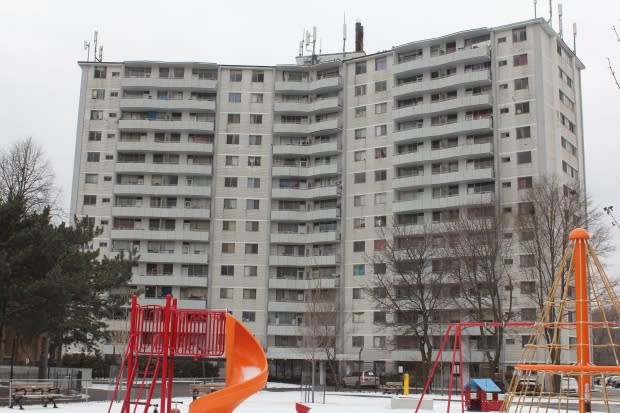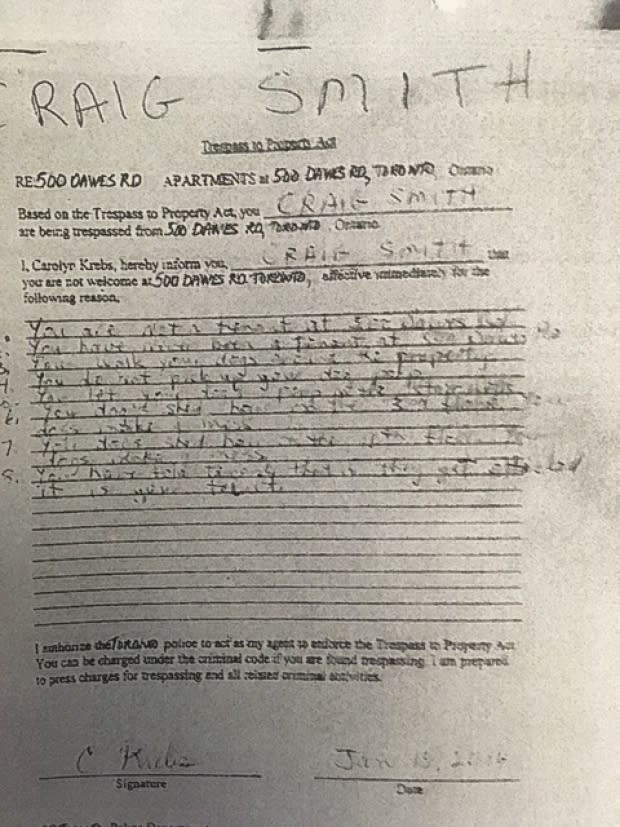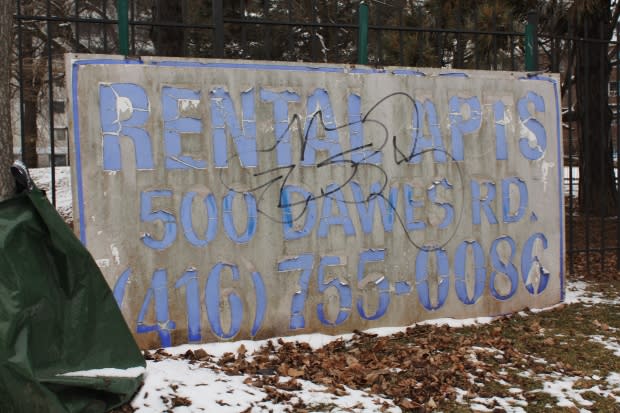Toronto landlord owes man with disabilities, daughter $60K after 'campaign' of harassment
A Toronto man was denied an apartment because of his disabilities, and then he and his pregnant daughter endured "a campaign" of abuse and harassment from the landlord after a relative helped them secure a unit and move into the building, according to a decision by the Human Rights Tribunal of Ontario (HRTO).
Six months later, the father and daughter are still waiting for the $60,000 their former landlord — Carolyn Goodman and her company Havcare Investments Inc. — was ordered to pay them in damages.
All Craig Smith wanted to do was rent a place for himself and his daughter on his own.
For most people, that might not be complicated, but the former elevator mechanic hadn't been able to do much independently since he was hit by a car 10 years ago and suffered a traumatic brain injury.
"I had trouble doing the daily tasks, getting dressed, going out in public, socializing with people," said Smith, who speaks with a noticeable stutter.
Smith's daughter, Tiara Ramnarine-Smith, was 12 when he was injured and started taking care of him. In the years since, Smith's condition has improved, but he's still unable to work and lives on Ontario Disability Support Program (ODSP) benefits.
So in July 2015, when he saw there were apartments for rent at 500 Dawes Rd., a highrise in Toronto's east end, he called the building, and then kept calling.
No 'units available for people like you'
"I was trying to be independent," Smith told CBC Toronto. "The superintendent, because I stutter a little bit, definitely knew who I was … I had 10, 15 phone conversations with them about getting an apartment and they always kept putting me off."

In one of those conversations, Smith was also told the building "only rented to working people" and "they did not have units available for people like you at this time," according to the HRTO decision.
That's when Ramnarine-Smith got her mother to apply for a unit in the building on their behalf, and she was able to secure an apartment right away, according to the HRTO decision.
The HRTO adjudicator found Smith "was discriminated against in housing when the respondents denied him housing accommodation in whole or in part because he is a person with a disability and because he is in receipt of social assistance."
But getting an apartment was only the first of a series of obstacles the father and daughter faced at 500 Dawes Rd. before the complaint was brought to the HRTO.
Trespass notice from landlord leaves Smith homeless
From the time the pair moved in, they say, staff claimed Smith didn't have a right to be in the building. But it wasn't until January 2016 that the landlord tried to do something about it.
That's when the landlord issued a trespass notice against Smith that was enforced by Toronto police "based on the entirely false allegation by the respondents that his daughter did not want him in the unit," according to the HRTO decision.

Ramnarine-Smith tried to explain to police that her father was a guest, and she had never told Goodman, the landlord, she wanted her father out, but police escorted Smith out of the building anyway.
With nowhere to go, a confused Smith spent a night on the subway, and then a few more nights in a homeless shelter.
"I was so scared, I didn't know what to do," Smith said. "I'd never been to a homeless shelter before in my life … and I had no food on me.
"I thought they were going to arrest me and put me in jail for something I didn't do — for something I should have been able to do."
Smith was kept from the apartment for over a month while the trespass notice was posted in the lobby of the building, and on various floors.
I thought they were going to arrest me and put me in jail ... for something I should have been able to do. - Craig Smith
Meanwhile, Ramnarine-Smith got in contact with a lawyer, through Legal Aid, who helped her get an order from the Ontario Landlord and Tenant Board to allow her father back in the building.
2 more eviction attempts
On top of the trespass notice, the HRTO decision details two other attempts the landlord made to evict Smith from her building.
The first was through the "false assertion" to the Landlord and Tenant Board that the pair were not paying rent, and the second involved telling ODSP "on several occasions that the rent was not being paid, resulting in their housing allowance being cut."
In both cases, the tenants proved they were paying rent.
Once Smith was allowed back in the building, the pair's day-to-day harassment amped up, according to Ramnarine-Smith.
"He would be walking the dogs around the building and he got stuff thrown off of balconies at him," she said. "It was not just the super and the landlords anymore — it was just random people."
One of the items thrown off a balcony was a beer bottle, which struck Smith in the head, according to the HRTO decision.

As a result of the abuse, numerous threats and the fact Ramnarine-Smith was pregnant, she told CBC Toronto,"we no longer felt it was even safe to leave our unit," and decided to move out of the building.
The HRTO decision sums up the landlord's actions as a "year-long campaign of harassment," and the adjudicator says "it is clear from the evidence that the respondents did not want Mr. Smith in the building and went to extraordinary lengths in an attempt to drive him out."
'We no longer felt it was even safe to leave our unit.' - Tiara Ramnarine-Smith
In compensation for that treatment, the HRTO awarded Smith $40,000 "for damages to his dignity, feelings and self-respect" and another $20,000 to Ramnarine-Smith for the same reasons.
No comment from landlord
CBC Toronto reached out to Goodman, the building's landlord, to talk about the HRTO decision, and ask why she hasn't complied with the order to pay the pair. But after a brief phone call, Goodman hung up. A subsequent email to her paralegal has gone unanswered.
Public record searches have shed some light on Goodman and her business.

Property records show Goodman, her children and her companies own at least a half-dozen apartment buildings and a few other houses in Toronto.
The landlord also operates under a few aliases. Tenants like Smith and his daughter knew Goodman as Marian Linton, and she also sometimes goes by her married name, Carolyn Krebs, although her legal name remains Goodman, according to a previous HRTO decision against Goodman from 2014.
HRTO ordered landlord to pay $10K in 2014
In that decision, Goodman was ordered to pay a young woman $10,000 for denying her an apartment based on her age. She was 17 at the time and under the care of the Children's Aid Society, which was helping her find housing.
The woman told CBC Toronto it took more than three years to get the money Goodman was ordered to pay by the HRTO. In the end, the woman said her lawyer got the money by garnisheeing rent payments made to Goodman.
Smith's and Ramnarine-Smith's lawyer, Benjamin Ries, says that's one of the options available to people like his clients who are trying to collect on any civil judgment, including those through the HRTO.
The tribunal does not enforce its own judgments.
"I think a lot of the problems with enforcement for tenants against their landlords start before they ever have a decision," said Ries.

"If the landlord has along the way managed to sell and move, or if the landlord has been really mysterious about their identity and their basic information, then it's a bit of a mystery how a lot of tenants are supposed to actually get that money."
In terms of his own clients, Ries is tight-lipped about how he plans to collect the $60,000 the father and daughter are owed.
Smith, on the other hand, remains doubtful they'll ever see the money.
"I've had too many experiences with this lady to feel I'm going to get it, until I get it," he said.
"She just tried to destroy me for no reason."

